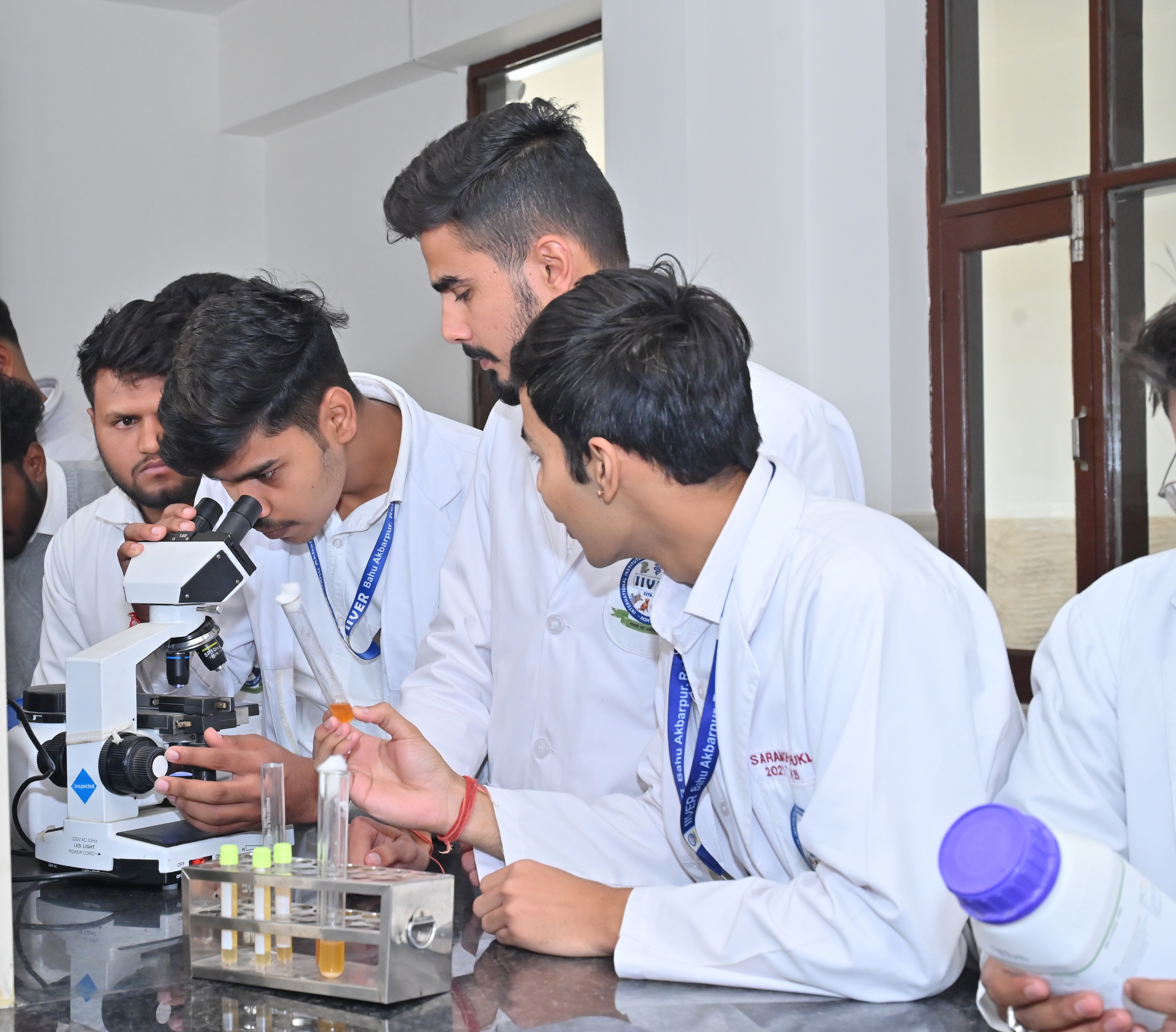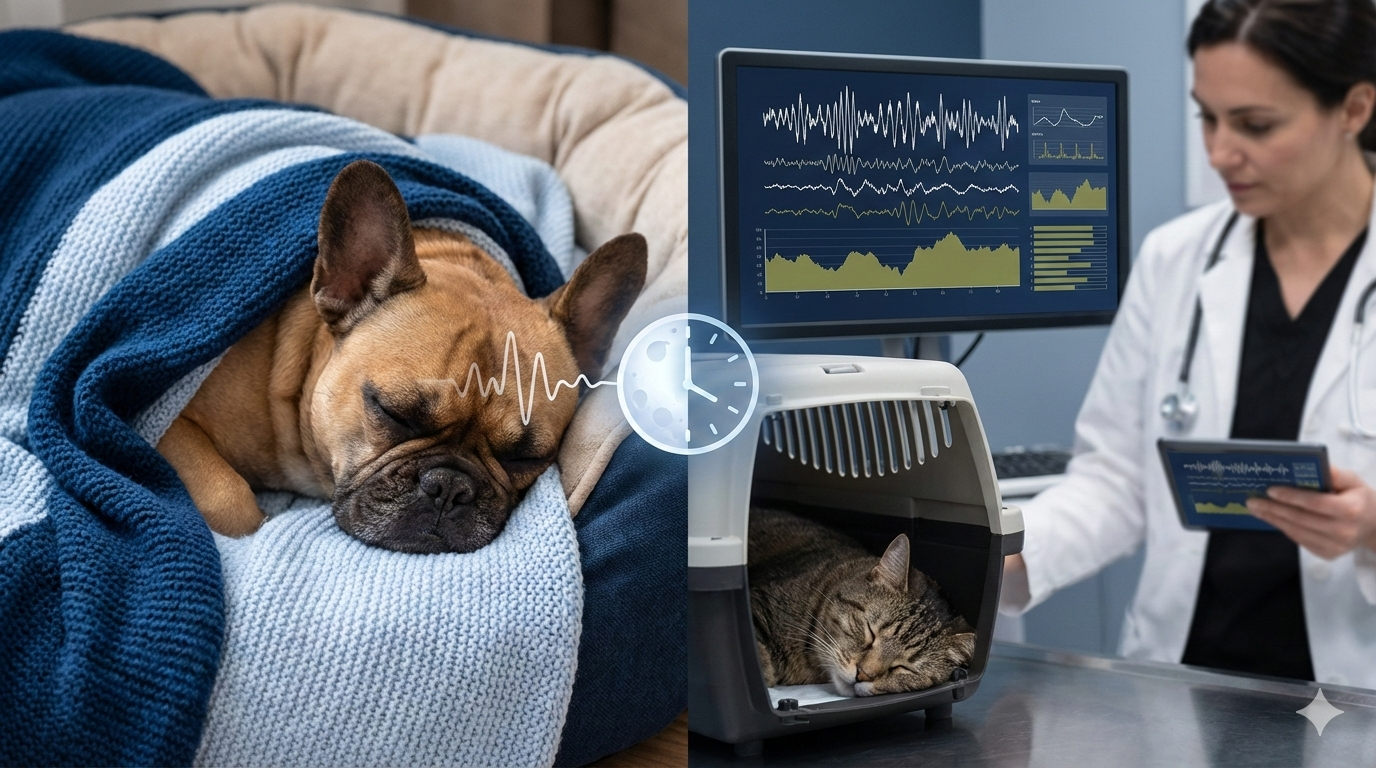Considering a career in veterinary science? Get answers to the top 10 questions about BVSc, including career prospects, admissions, and what it takes to be a successful veterinarian.
Choosing a career path is one of the most significant decisions a student makes. For those with a deep love for animals and a desire to contribute to their well-being, the Bachelor of Veterinary Science and Animal Husbandry (BVSc-AH) program often comes into consideration.
To help you navigate this crucial decision, we've compiled the top 10 most frequently asked questions by students considering BVSc, along with comprehensive answers. Let's explore!
1. What Exactly is BVSc and What Does it Cover?
BVSc, or Bachelor of Veterinary Science and Animal Husbandry, is an undergraduate degree program focused on the health and welfare of animals. It's not just about treating sick pets; the curriculum is vast, covering:
- Animal Anatomy & Physiology: Understanding how animal bodies work.
- Pharmacology: The study of medicines and their effects on animals.
- Pathology: The study of animal diseases.
- Surgery & Medicine: Practical skills for treating various animal conditions.
- Animal Nutrition: Ensuring proper diet for different species.
- Livestock Management: Health and productivity of farm animals.
- Public Health: Zoonotic diseases (diseases transferable from animals to humans) and food safety.
- Veterinary Ethics & Jurisprudence: Legal and ethical aspects of the profession.
2. What are the Career Prospects After Completing BVSc?
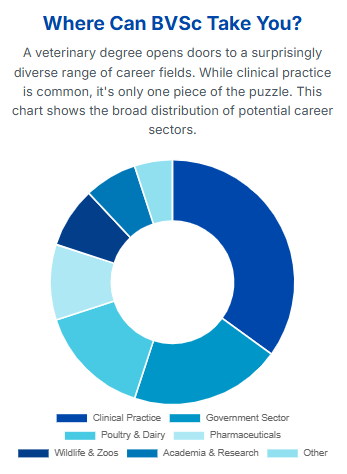
The career landscape for a BVSc graduate is incredibly diverse, extending far beyond just a local vet clinic. Here are some key areas:
- Clinical Practice:
- Companion Animal (Pets): Dogs, cats, birds, exotic animals.
- Large Animal (Livestock): Cattle, sheep, goats, pigs.
- Equine (Horses).
- Government Sector:
- Veterinary Officer in state animal husbandry departments.
- Research and development in government labs.
- Disease control and surveillance.
- Poultry & Dairy Industry:
- Managing health and productivity in large-scale farms.
- Pharmaceutical Companies:
- Research, development, and sales of animal medicines and vaccines.
- Wildlife & Zoo Management:
- Working with wild animals in conservation efforts or zoos.
- Academia & Research:
- Teaching in veterinary colleges or pursuing advanced research.
- Food Safety & Public Health:
- Ensuring the safety of animal products for human consumption.
- Armed Forces:
- Veterinary Corps in the army.
3. Is BVSc a Good Career Choice for Me? (Passion & Commitment)
This is a deeply personal question. BVSc is not just a degree; it's a demanding profession that requires:
- Genuine Love for Animals: This is fundamental. You'll encounter animals in various states, from playful puppies to critically ill livestock.
- Strong Scientific Aptitude: A solid grasp of biology, chemistry, and physics is essential.
- Empathy & Patience: Animals can't tell you what's wrong, so observation and patience are key.
- Physical & Mental Stamina: Long hours, emergency calls, and emotionally challenging situations are part of the job.
- Resilience: Dealing with animal suffering and owner grief can be tough.
- Communication Skills: You'll interact extensively with animal owners, not just the animals themselves.
If you're passionate, dedicated, and ready for the challenges, then yes, it can be an incredibly rewarding path.
4. What are the Admission Requirements for BVSc?
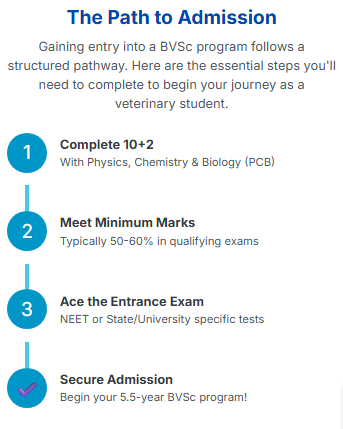
Admission criteria can vary slightly between universities, but generally, you'll need:
- Educational Qualification: Completion of 10+2 (or equivalent) with Physics, Chemistry, and Biology (PCB) as core subjects.
- Minimum Marks: A certain percentage (e.g., 50% or 60%) in the qualifying examination.
- Entrance Exams: Most reputable BVSc colleges admit students based on national or state-level entrance examinations.
- NEET (National Eligibility cum Entrance Test): Increasingly, NEET scores are being used for BVSc admissions in India.
- State-Level Entrance Exams: Some states conduct their own common entrance tests for veterinary colleges.
- University-Specific Exams: A few universities might have their own tests.
- Age Limit: Usually a minimum age of 17 years.
5. Which are the Top BVSc Colleges/Universities?
While specific rankings can fluctuate, India has several well-regarded veterinary colleges. It's advisable to research institutions affiliated with agricultural universities or dedicated veterinary universities. Look for:
- Accreditation: Ensure the college is recognized by the Veterinary Council of India (VCI).
- Infrastructure: Modern labs, well-equipped hospitals, and research facilities.
- Faculty: Experienced and knowledgeable professors.
- Practical Exposure: Opportunities for internships, clinical rotations, and hands-on training.
- Placement Records: Success rate of graduates in securing jobs.
Pro Tip: Always check the latest VCI regulations and university brochures for the most up-to-date information.
6. What is the Duration and Structure of the BVSc Course?
The BVSc & A.H. program typically spans 5.5 years. This includes:
- 4.5 years of academic study: Covering theoretical knowledge and practical skills.
- 12 months of compulsory rotating internship: This hands-on period is crucial for gaining real-world clinical experience under supervision in various departments (medicine, surgery, public health, livestock farms, etc.). It's mandatory for registration with the Veterinary Council of India.
7. What is the Typical Salary Range for Veterinarians?
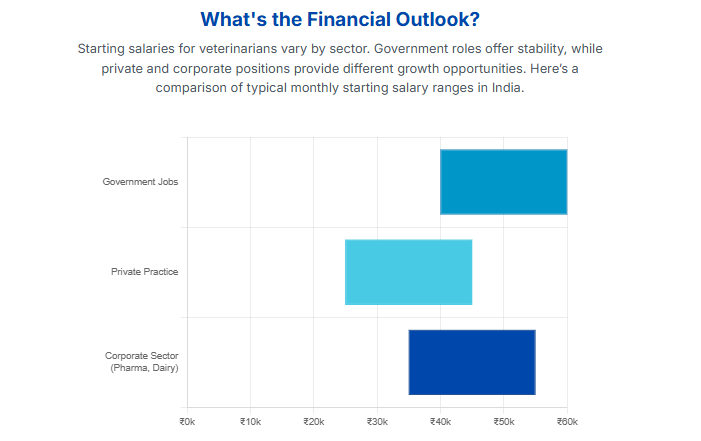
Starting salaries for BVSc graduates can vary significantly based on the sector, location, and type of practice.
- Government Jobs: Generally, offer stable salaries with benefits, starting from approximately ₹40,000 - ₹60,000 per month for a Veterinary Officer.
- Private Practice: Entry-level salaries might be lower (e.g., ₹25,000 - ₹45,000 per month) but can grow substantially with experience, specialization, and building a client base. Experienced private practitioners, especially those with their own clinics, can earn significantly more.
- Corporate Sector (Pharma, Dairy): Often offers competitive packages, potentially starting higher than some private clinics.
8. Are There Opportunities for Specialization After BVSc?
Absolutely! After completing your BVSc, you can pursue postgraduate studies (MVSc - Master of Veterinary Science) to specialize in various fields. This enhances your expertise and career prospects. Some popular specializations include:
- Veterinary Surgery & Radiology
- Veterinary Medicine
- Veterinary Pathology
- Veterinary Microbiology
- Animal Nutrition
- Livestock Production & Management
- Veterinary Public Health & Epidemiology
- Veterinary Gynaecology & Obstetrics
- Wild Animal Health
9. What are the Challenges of Being a Veterinarian?
While rewarding, the profession comes with its unique set of challenges:
- Emotional Toll: Dealing with sick or dying animals and grieving owners can be emotionally draining.
- Long & Irregular Hours: Especially in private practice, emergency calls and weekend work are common.
- Physical Demands: Handling large or aggressive animals can be physically taxing and risky.
- Communication Barriers: Animals can't speak, so diagnosis relies heavily on observation, owner information, and diagnostic tests.
- Financial Constraints: Sometimes, owners may not be able to afford necessary treatments, leading to difficult decisions.
- Ethical Dilemmas: Making tough calls regarding euthanasia, animal welfare, and public health.
10. How Can I Prepare for BVSc Entrance Exams?
Preparation is key to cracking competitive entrance exams. Here's how to approach it:
- Strong Foundation in PCB: Focus on your 11th and 12th-grade Physics, Chemistry, and Biology concepts. NCERT textbooks are highly recommended.
- Understand Exam Pattern: Familiarize yourself with the syllabus, marking scheme, and types of questions asked in NEET or specific state exams.
- Practice Previous Year Papers: This helps you understand the difficulty level and time management.
- Mock Tests: Regularly take mock tests to assess your preparation and identify weak areas.
- Time Management: Develop a study schedule and stick to it.
- Coaching (Optional): Consider joining a coaching institute if you need structured guidance.
Conclusion
Choosing BVSc is a significant step towards a fulfilling career dedicated to animal health and welfare. By understanding the curriculum, career opportunities, challenges, and admission requirements, you can make an informed decision that aligns with your passion and aspirations. If you're ready for a challenging yet incredibly rewarding journey, the world of veterinary science awaits!

